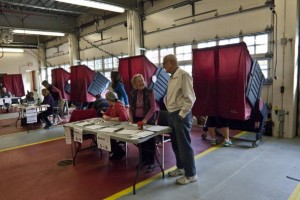This is mark Joseph “young” blog entry #11, on the subject of Caring About Off-Year Elections.
I was musing on politics–and despite the preponderance of such posts in these early days of the blog, I am not really all that interested in politics, it just happened to become my job at some point and it has stuck with me. What struck me is that we are less than two weeks from election day, and I do not even know what is on the ballot. But, I thought, who cares about off-year elections? What difference does it make?
And I found that I knew the answer to the second question; maybe the answer to the first is that you care, or at least you should.

Look for a moment at the field of Presidential candidates for next year’s election. The Republican field has been very crowded, but what is particularly interesting is the number of young candidates in it. Marco Rubio, who has a good chance of if not winning the nomination being tapped for Vice President, is forty-four years old. Bobby Jindal is the same age, and Ted Cruz, Tea Party favorite, is only a few months younger. Certainly there are older candidates in the race. Current frontrunner Donald Trump is sixty-nine, Ben Carson sixty-four, and Carly Fiorina 61 (but note that none of these candidates have previously held political office). But Rand Paul is only fifty-two and Chris Christie fifty-three.
Now look at the Democrats. We have a serious race between sixty-nine year old Hillary Clinton and seventy-four year old Bernie Sanders. Of the other candidates who were in the race, Jim Webb is sixty-nine, Lincoln Chafee (who recently dropped out of the race) is sixty-two, and the youngest of the batch, at fifty-two, is Martin O’Malley. The only other “young” candidate, not even known to most voters, is law professor Larry Lessig, at fifty-four. The two candidates people hoped would enter the race are also older, Elizabeth Warren at sixty-six and Joe Biden at seventy-three.
It is a sad showing for a party that claims to be the party of the young. Of course, its current leader, President Barrack Obama, is “only” fifty-four, but there are no young candidates in this race.
It may be that younger candidates are letting their elders go first, and there is some wisdom in electing the more experienced (although not usually the wisdom of the Democratic party, who with Kennedy, Bill Clinton, and Obama went for the younger leader). There are promising young Democrats, such as New Jersey Freshman Senator Cory Booker. However, they are seriously outnumbered. Republicans currently hold majorities in the Senate and House of Representatives, but in some ways more importantly they hold the majority of state executives and the majority of state legislative houses. That means there are more young Republicans coming up through the ranks than there are young Democrats.
Of course, that does not much bother me. The Democrats have taken many positions which in my opinion range from untenable to heinous (although they hold some positions with which I agree). That the Republicans dominate politics is a good thing, to my mind. It is those of you who support the Democrats who need to put Democrats in those offices–because most national politicians started as state politicians, and most state politicians started as county and local politicians, and if you expect to have electable Presidential candidates in the future you must have mayors and freeholders and state legislators in the present. As it happens, the demographic that perceives the importance of being involved in local political races happens to lean very conservative, and so puts Republicans in those positions during off-year elections. The Democrats know this; they just have no solution for it.
So now that I’ve told the Democrats what they need to do for long-term success, Republicans also need to be told: if you are going to keep this grassroots strength, you have to continue to overmatch the Democrats at the local level. Your vote matters, because even if you are not all that interested in what the next mayor is going to do in your town, or how the county freeholders are going to manage the budget, putting Republicans in those offices keeps you on the road to controlling the future–not to mention that there are still some state legislatures and executive houses you do not hold, still enough Democrats in office to thwart Republican policies in many places. Local and county offices are the recruiting grounds for state officials, and state government is the springboard to national government, yet also what local, county, and state governments do on the lower levels matters in advancing or impeding party policies. Our beleagured Democratic President can advance no policies against his opposing Republican Congress, but even when the Democrats controlled national government completely, they often found policies thwarted by Republican state governments.
So now you know why you should vote. I am working on an article which hopefully will help New Jersey voters with the election, so keep watching this site.
I have previously published quite a few articles about voting. Among the more relevant, see Election Law, Re-election Incongruity, Polarization, and the article sections Voting in the New Jersey 2014 Congressional Primary and Election Day: Time to Vote.
[contact-form subject='[mark Joseph %26quot;young%26quot;’][contact-field label=’Name’ type=’name’ required=’1’/][contact-field label=’Email’ type=’email’ required=’1’/][contact-field label=’Website’ type=’url’/][contact-field label=’Comment: Note that this form will contact the author by e-mail; to post comments to the article, see below.’ type=’textarea’ required=’1’/][/contact-form]